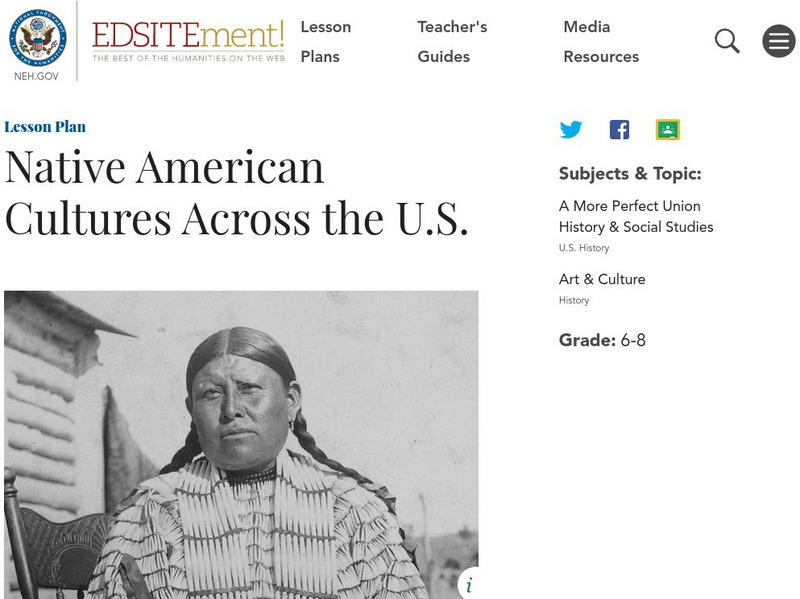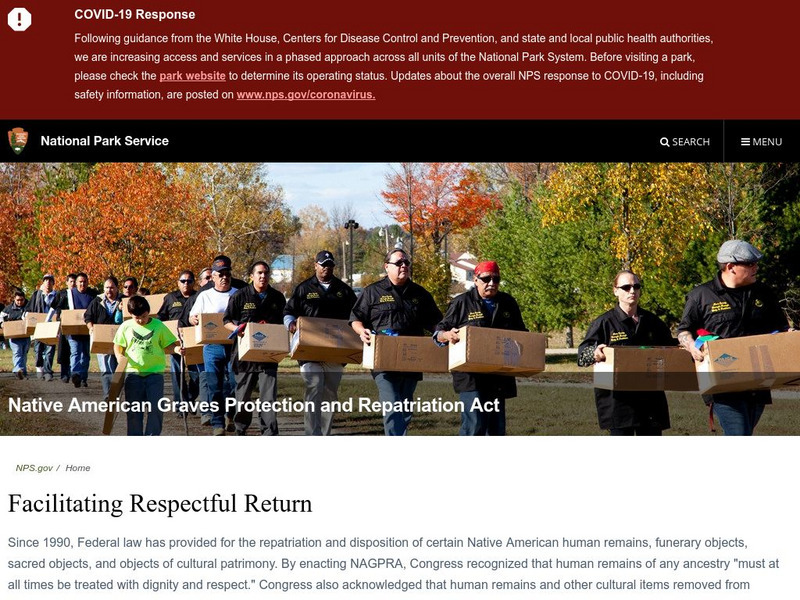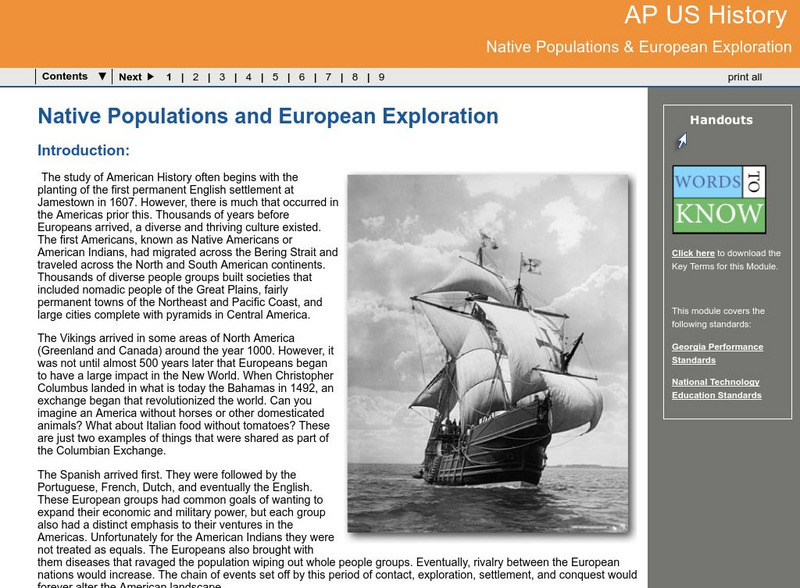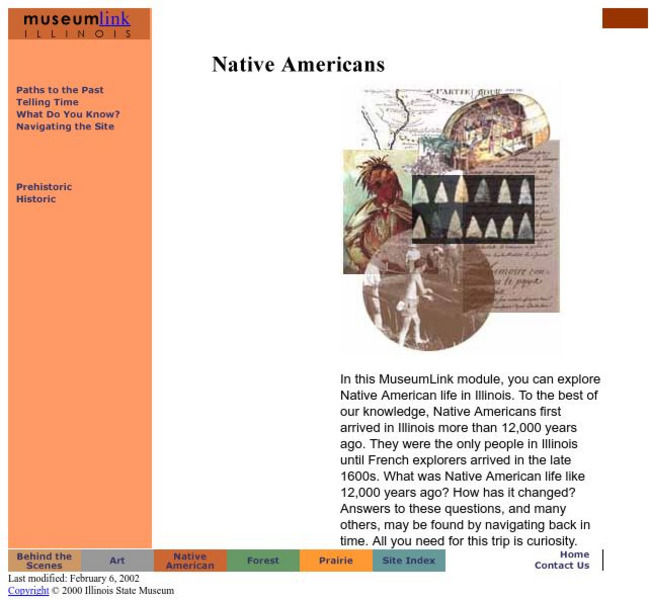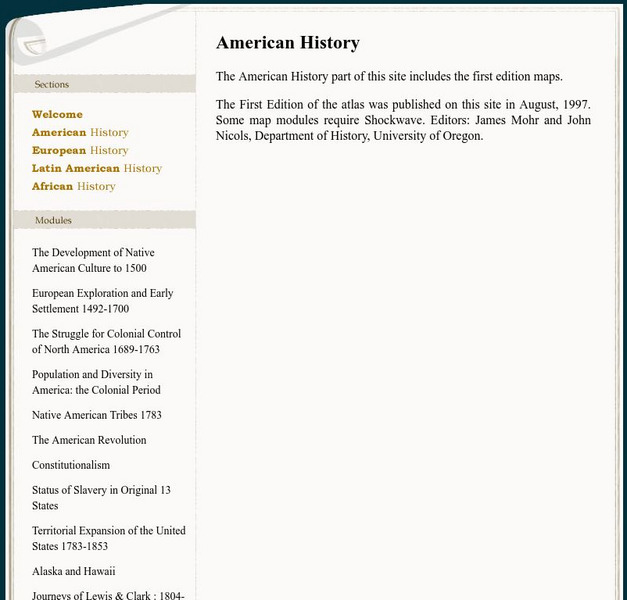Hi, what do you want to do?
Khan Academy
Khan Academy: Ap Us History: Native American Culture of the Southeast
The dominant Mississippian culture of the Southeast signaled agricultural success and urban development for a variety of Native American groups.
National Endowment for the Humanities
Neh: Edsit Ement: Native American Cultures Across the United States
Students explore different aspects of the cultures of the First Americans in this lesson plan. Stereotypes are often associated with Native Americans through movies and in the context of the Thanksgiving holiday. Specific information and...
Curated OER
National Park Service: Native American Graves Protection and Repatriation Act
Site explains the federal law that was passed in 1990 that protects Native American cultural items: the Native American Graves Protection and Repatriation Act(NAGPRA). The site answers FAQ on the NAGPRA and keeps online databases of...
Georgia Department of Education
Ga Virtual Learning: Ap Us History: Native Populations & European Exploration
AP U.S. History learning module explores the encounter and interactions between European explorers and Native populations in America. Complete set of resources, interactive material, assignments and assessment.
Other
Illinois State Museum: Native Americans
Explore aspects of Native American life in Illinois at this colorful website. Just click on the topics at the left to learn about this group during prehistoric and historic times.
Khan Academy
Khan Academy: Us History: 1800 1848: The Presidency of Andrew Jackson
Andrew Jackson was the president for the common man. Under his rule, American democracy flourished as never before- but the economy and the Native American population suffered at his hands.
Khan Academy
Khan Academy: Us History: 1865 1898: Indian Wars/ Battle of the Little Big Horn
In the late nineteenth century, the US Army clashed with Native Americans, and General Custer took his last stand.
Khan Academy
Khan Academy: Us History: 1865 1898: The Dawes Act
The 1887 law intended to assimilate Native Americans led to the loss of millions of acres of land.
Khan Academy
Khan Academy: Us History: 1865 1898: The Reservation System
In the nineteenth century, Native Americans were confined to reservations to open up land for white settlers.
Khan Academy
Khan Academy: Us History: 1800 1848: Indian Removal
In the 1830s, President Andrew Jackson pursued a policy of Indian Removal, forcing Native Americans living in Georgia, Florida, and Mississippi to trek hundreds of miles to territory in present-day Oklahoma.
Khan Academy
Khan Academy: Us History: 1491 1607: Quiz 1
Take this five question quiz over the Native Americans and European exploration in the Americas.
University of Oregon
Mapping History Project : Native American Tribes: 1783
This is a simple map showing where Native American tribes were established in 1783 in the new United States.
Independence Hall Association
U.s. History: Native American Resilience and Violence in the West
Learn about the struggles the new United States government had in coming to terms with the various Native American tribes who lived in the new country.
Independence Hall Association
U.s. History: Native American Society on the Eve of British Colonization
This is a brief overview of the Native American cultures, languages, and diversity amont the many tribes that lived in North America prior to European contact.
University of Oregon
Mapping History: American History
Interactive and animated maps and timelines of historical events and time periods in American history from pre-European times until post-World War II.
Khan Academy
Khan Academy: Us History: 1800 1848: The War of 1812
The War of 1812 pitted US forces against those of Great Britain in a battle for control over the destiny of the North American continent.
Khan Academy
Khan Academy: Us History: 1491 1607: Native American Societies Before Europeans
A quick comprehension check over Native American societies before European contact.
Khan Academy
Khan Academy: Ap Us History: 1865 1898: The American West: The Dawes Act
Explains what the impact of the Dawes Act of 1887 was on Native American Indians. Discusses the conflicts between whites and Native Americans that led to its passage and amendments made later. Includes questions for students at end.
Khan Academy
Khan Academy: Cultural Interactions Between Europeans, Native Americans, and Africans
A self-assessment using primary sources examining the cultural interactions between Europeans, Native Americans, and Africans during the U.S. History period of 1491-1607.
Khan Academy
Khan Academy: Native American Culture of the West
Native American peoples throughout the Western region determined their unique lifestyle by their proximity and abundance of natural resources. This article discusses their food practices, social structures, and religious norms.
Khan Academy
Khan Academy: Native American Culture of the Northeast
Hopewellian culture dominated the Northeast region from 200 BCE to 500 CE, where Native American groups began large-scale three-sister farming. Read more about these tribes and find out why many historians argue that the Iroquois League...
Khan Academy
Khan Academy: Ap Us History: 1865 1898: The American West: Reservation System
Discusses the Indian reservation system, the impact it had on Native Americans, violent clashes between whites and Indians, and how it was destroyed by the Dawes Act of 1887 and resurrected in the 1930s. Includes questions for students...
Khan Academy
Khan Academy: Us History: 1865 1898: Chinese Immigrants and Mexican Americans
Like Native Americans, Mexican Americans and Chinese immigrants suffered harsh consequences due to relentless westward expansion by whites in the nineteenth century.
Khan Academy
Khan Academy: Us History: 1800 1848: The Presidency of John Quincy Adams
John Quincy Adams narrowly beat Andrew Jackson in the presidential election of 1824. Though his 'American System' modernized the American economy, his endorsement of a protective tariff as well as his lenient stance toward Native...






